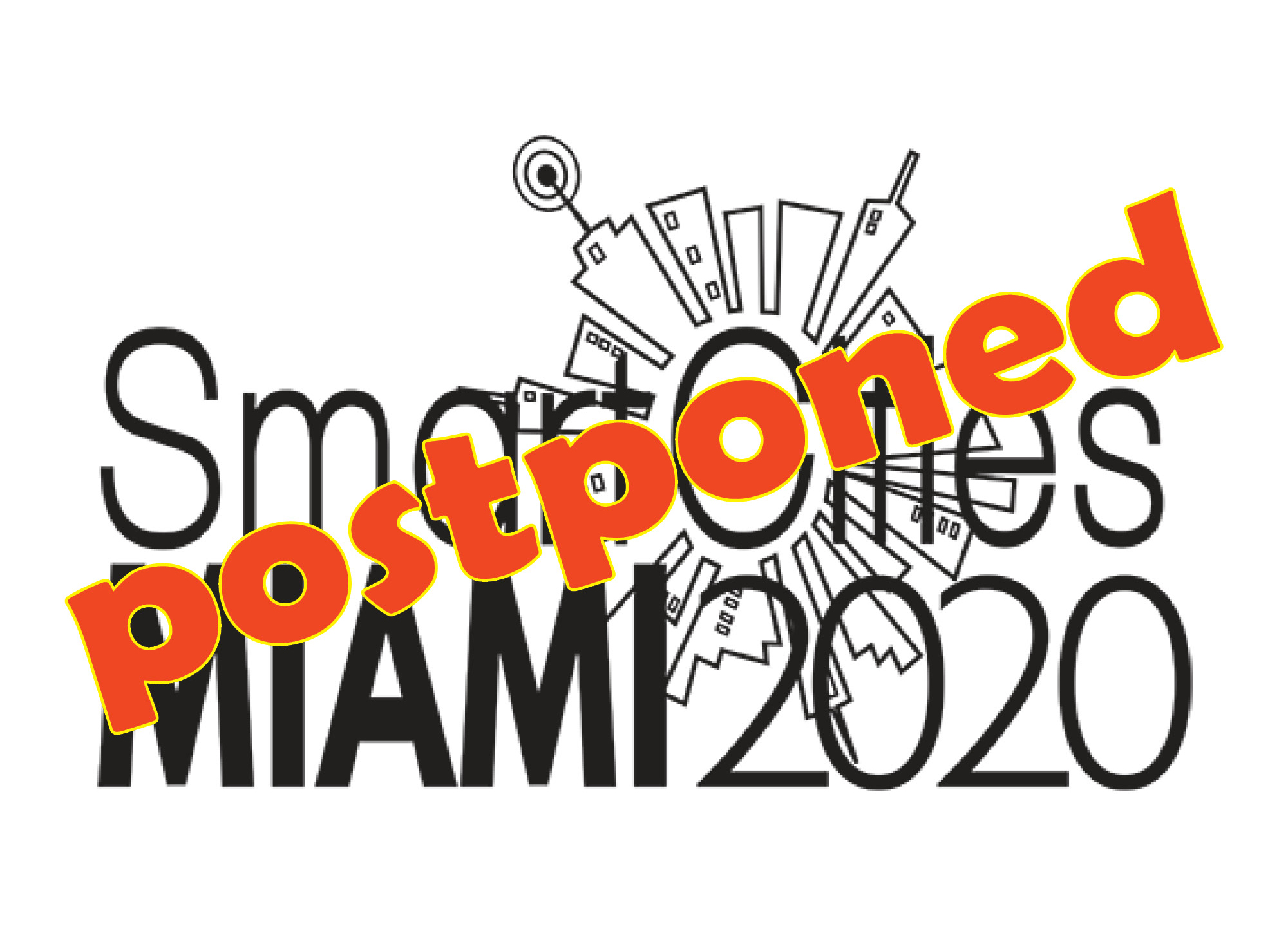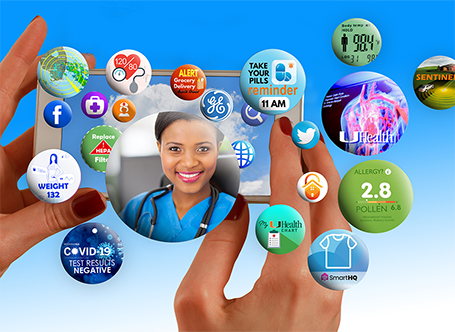
Smart Cities 2021 Theme: Health and Wellbeing in the Post-Pandemic City
The Annual Smart Cities MIAMI Conference provides a forum to consider topics within a general theme relevant to each year. The theme for the 2021 edition was health and wellbeing in the post-pandemic city, and provided opportunities to explore questions such as:
• How can Smart City technology monitor the emergence and transmission of contagious diseases?
• Will Smart City technology be used to enforce compliance to safety guidelines? And what will be the consequences for individual rights and privacy?
• How do embedded technology, IoT, and digital media enable healthcare at home?
The University of Miami School of Architecture and Frost Institute for Data Science and Computing presented the 4th annual Smart Cities MIAMI Conference on Thursday, April 15, 1:00-4:00 PM.
Sponsor Center for Accelerated Real Time Analytics (CARTA)


AGENDA(No program was created for 2021) |
|
| 1:00-2:40 | Welcome Address – Provost Duerk and Dean el-Khoury |
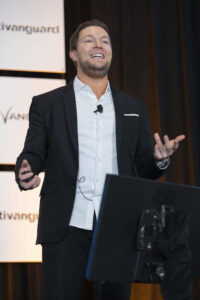 |
Keynote Speaker Michael Mylrea, PhD Dr. Michael Mylrea is Senior Technical Advisor to University of Miami CARTA. He has led various Cybersecurity R&D efforts for industry, government, and academia. As a Cybersecurity Executive at GE Global Research, he led the development of GE’s first AI/ML driven cybersecurity industrial immune systems and various solutions for Operational Technology (IIoT, ICS, IoT). Dr. Mylrea has +18 years of experience solving complex cybersecurity, energy, technology, and national security challenges. He holds +13 cyber and blockchain patents and led cybersecurity product and R&D efforts, including one of the first and largest federally funded blockchain projects – credited with ushering blockchain tech research to the national lab system. He launched and led a successful ethical hacking cybersecurity company and has held CISO and senior technical positions in industry, government, including, but not limited to: GE, Pacific Northwest National Lab, the U.S. Departments of Energy and Defense, CT7 (CISO), Deloitte, US Cyber Consequences Unit, Harvard Berkman Klein Center, and Democracy Council (CIO). He has led cybersecurity training, strategy, and advisory efforts with large industry clients, including, but not limited to: GE, Bank of America, Google, UTRC (Raytheon), IBM, Tenable, Siemens, and various large energy utilities and finance companies. Michael has helped influence various standards, working groups, and regulations through participation in Group of 7, National Security Council, National Science Foundation, National Academy of Science, IEEE, NDIA, AAAI, and NIST advisory, panels, and boards. He frequently keynotes large conferences and workshops such as RSA and IoT World. His work has appeared in news, journal articles, television, and congressional testimony and is frequently cited in technical, industry, and government publications. Dr. Mylrea is a National Science Foundation CyberCorps Scholar alum, completing his Doctorate at George Washington University (GWU) on Cybersecurity. He finished his M.S. Cybersecurity course work at WGU, focusing on information assurance and operational cyber resilience. Michael also received an MA from The Fletcher School at Tufts University, where his thesis focused on international cybersecurity policy, law and regulation. He completed coursework at Harvard Law School, Kennedy School of Government, and MIT Sloan; two BAs from the University of Wisconsin-Madison. Michael is a recipient of a number of distinguished awards (Fulbright Scholarship, NSF CyberCorps, Rosenthal Fellowship, FDD National Security Fellowship, Top 99 Future Leaders Award). Michael speaks Hebrew, Arabic, Spanish, and Portuguese and is proficient in auditing various computer languages. |
| SESSION 1: Health Care in the Smart City
This panel discussion will consider opportunities provided by smart city technology for transforming health care. From embedded technology to IoT, data analytics, and AI, the adoption of emergent technology is intensifying with the urgency precipitated by the pandemic. How will the hospital, the clinic, and the home connect and synergize in the post-COVID networked city? What lessons have we learned and what innovative practices will outlast the crisis to revolutionize health care? The panel brings views from different angles to capture a cross-section of a rapidly evolving landscape. |
|
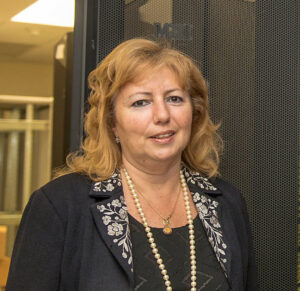 |
MODERATOR Yelena YeshaDr. Yelena Yesha is Chief Innovation Officer and Head of International Relations for IDSC. In this role, Dr. Yesha assists faculty in engaging government and industrial partners to collaborate with the University, and she consults with faculty on developing research ideas into innovations. She is the Director of the National Science Foundation (NSF) Center for Accelerated Real Time Analytics (CARTA), and an international leader in Blockchain. |
PANELISTS |
|
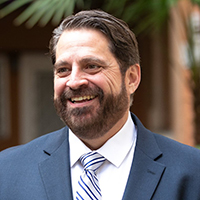 |
Frank RicottaWith 30+ years of experience as a CEO and CTO, Frank Ricotta uses his strong entrepreneurial, problem solving, and communication skills to create world-class solutions that capitalize on market opportunities. Frank is currently the CEO & Founder of BurstIQ, which solved the fundamental challenge that prevented blockchain from being utilized in the healthcare space by supporting large, complex, and disparate data on chain, while maintaining privacy and security. |
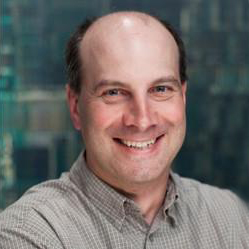 |
Mic BowmanSr. Principal Engineer, Intel Labs, Mic Bowman leads the decentralized computing research group. He has spent over 20 years working on large-scale databases and distributed systems. Among other roles he served as a member of the Hyperledger Technical Steering Committee for several years contributing to architecture definition and evaluation of technologies for privacy and confidentiality. He is currently working on methods for improving the security, scalability, and privacy of distributed ledgers. |
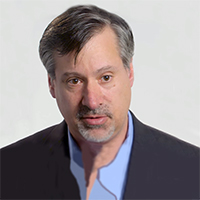 |
Jeb LintonSenior Technical Staff Member and Master Inventor at IBM, Jeb Linton is the CTO for Partner Ecosystem and Cognitive Security within IBM Cloud, Program Director for the National Capital Area Center for Advanced Studies, and founder of the IBM Cognitive Security initiative. Mr. Linton is a Master Inventor, and has worked for IBM since 2008 as technical strategist and architect on numerous Cloud Computing, Storage, Security, and Cognitive Computing projects. |
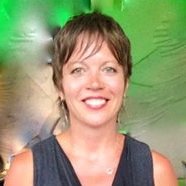 |
Pamela TomskiPamela Tomski is an analytics advisor and energy/CCUS expert. She works with SAS, a leader in big data analytics, AI, and ML, to expand their analytics footprint and partnerships with the US Department of Energy (DOE), US Environmental Protection Agency (EPA), and the Bureau of Ocean and Energy Management (BOEM). She also builds and participates in R&D partnerships with national labs, industry, and academic research organizations. |
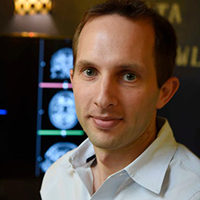 |
Pierre-François D’HaesePierre-François D’Haese’s research interests include Medical Image Processing and Analysis, Image Registration, Computer-Assisted Intervention. He is the CEO, Neurotargeting; Director of Digital Health and Imaging Analytics, Rockefeller Neuroscience Institute; and Research Assistant Professor of Electrical Engineering, Vanderbilt Institute for Surgery and Engineering (VISE). |
| 2:40-2:50 | Break |
| 2:50-3:35 | SESSION 2: University of Miami Innovation Showcase This session presents work in progress at the University of Miami. The spotlight is on an interdisciplinary team that is taking on some of the challenges and opportunities brought up in the preceding discussion. The project reinvents the hospital by reconstituting it as a distributed network, including the home as a technology-empowered hub. Team members include researchers in medicine, computer/data science, architecture, biomedical engineering, biochemistry, and molecular biology, all converging on IDSC as a locus for innovation in the smart city arena. The session features a demonstration of concepts and prototypes in development followed by a discussion of further potential and applications. |
PANELISTS |
|
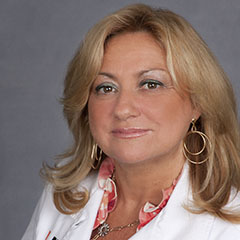 |
Sylvia DaunertSylvia Daunert, PharmD, MS, PhD is the Lucille P. Markey Chair of Biochemistry and Molecular Biology at the UM Miller School of Medicine, Associate Director of the JT MacDonald Foundation Biomedical Nanotechnology Institute of the University of Miami, and Director of Research, for the Center for Integrative and Complementary Medicine. Dr. Daunert’s research interests are in Bionanotechnology. |
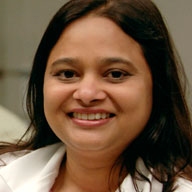 |
Sapna DeoDr. Sapna Deo is an Associate Professor and Graduate Program Director at the Biochemistry and Molecular Biology at the UM Miller School of Medicine. Dr Deo’s research interest is in the development of technologies for the detection of pathogens for resource-poor settings. Her work also involves the design of novel nanobioanalytical techniques based on luminescence and quantum dots for detection of microRNAs and RNA molecules for application in biomedicine, diagnosis, and pathogen detection. |
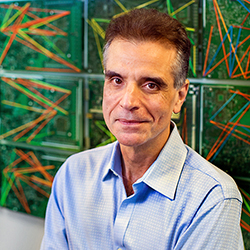 |
Nick TsinoremasNicholas F. Tsinoremas, PhD, is the Vice Provost for Research Computing and Data and Founding Director of the Frost Institute for Data Science and Computing (IDSC), which was established to catalyze data-intensive research in fields ranging from medicine to earth sciences, urban planning, digital humanities, and business. He also holds faculty appointments in the Miller School of Medicine and the College of Arts and Sciences. |
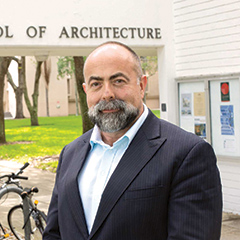 |
Rodolphe el-Khoury (Lead Presenter)Rodolphe el-Khoury, PhD, is Dean of the UM School of Architecture. Dean el-Khoury was trained as an historian and practitioner and continues to divide his time between scholarship and design for his firm Khoury Levit Fong (KLF). His current research focuses on applications for IT aiming for enhanced responsiveness and sustainability in buildings and smart cities, and the application of robotics and embedded technology, including immersive environments and multi-sensory architecture. |
 |
Yelena YeshaDr. Yelena Yesha is Chief Innovation Officer and Head of International Relations for IDSC. In this role, Dr. Yesha assists faculty in engaging government and industrial partners to collaborate with the University, and consults faculty on developing research ideas into innovations. She is the Director of the National Science Foundation (NSF) Center for Accelerated Real Time Analytics (CARTA), and an international leader in Blockchain. |
| 3:40 | Plenary Keynote Speaker |
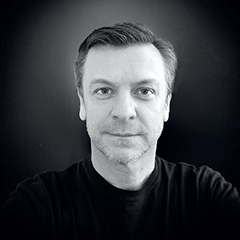 |
Mark Wolff, MS PhD Advisory Industry Consultant | Chief Health Analytics StrategistGlobal IoT Division, SAS Institute Dr. Wolff has more than 25 years of experience in health care, working in the US and Europe. He is recognized as an accomplished practitioner and thought leader in the development and application of advanced and predictive analytics to complex problems in the Health Care and Life Science Industries. His current focus is on the development and application of machine learning and artificial intelligence approaches to real-time, sensor/IoT data in support of health outcomes and safety research, visualization, and development of intelligent, decision support systems. |
| TALK TITLE: Your Digital Twin Will See You Now—How the Internet of Medical Things and Edge Analytics are Changing Health Care
Value-Based Care and Patient Centricity have emerged as global paradigms to address how patient and overall health care are delivered and paid for. This will incentivize care providers to better engage patients and to more consistently adopt evidence-based medicine in diagnosis and treatment decisions. A major driving force behind this transformation is the emergence of the Internet of Medical Things or more specifically, connectivity between patients, clinicians, machines, and care environments. This connectivity will, ultimately, result in an exponential increase in the amount, dimensionality, and velocity of data available for operational and clinical decision-making. Perhaps one of the most important elements of this transformation will be the concept of the “Digital Twin”, an algorithmic, dynamic, in silico representation of an individual’s present and future health status, enabling faster and more precise diagnoses and more scientific determination of the most appropriate and effective treatment plan. |
|
| 4:00 | Closing Remarks |
Post-Event VIDEO and Story from: NEWS@TheU by Ashley A. Williams
When you think of sensors being in your home, your mind more than likely drifts to motion sensors, light sensors, or even fire alarms, but an expert team at UM is developing a concept beyond mainstream smart home technology—one that can change the way we live our everyday lives.
At the fourth annual and first virtual Smart Cities Miami 2021 Conference, co-hosted by the School of Architecture and the Frost Institute for Data Science and Computing (IDSC), Rodolphe el-Khoury, Dean of the School of Architecture, led a session titled “University of Miami Innovation Showcase,” which featured the work of an interdisciplinary team that is confronting some of the challenges and opportunities presented by COVID-19.
“The project we’re sharing today is in line with previous efforts we’ve presented, but this model is an interconnectivity of all scales,” said Dean el-Khoury. “It will involve the clinic, the hospital, the pharmacy, and of course, the home, which we see as an extension of the clinic and the primary site of healthcare.”
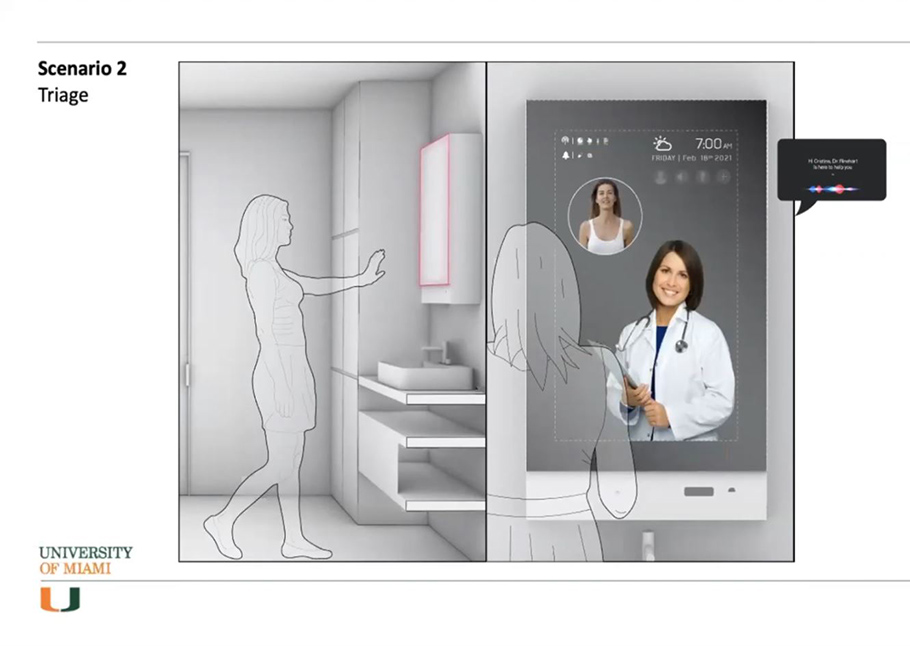
The work in progress reinvents the current hospital model by modifying it as a dispersed network that will include the home. The cutting-edge concept, described as a technology-empowered smart home health hub, can turn your living space into an interactive, mixed-reality experience that can connect you to your physician in seconds.
“It’s the microcosm of the entire system because it encapsulates and concentrates four main functions: monitoring, treating, communicating, and data analysis,” said el-Khoury. “We think of it as the Swiss Army knife of sensors, jampacked with everything we are already developing. It can be customized and connected to appliances you already may have.”
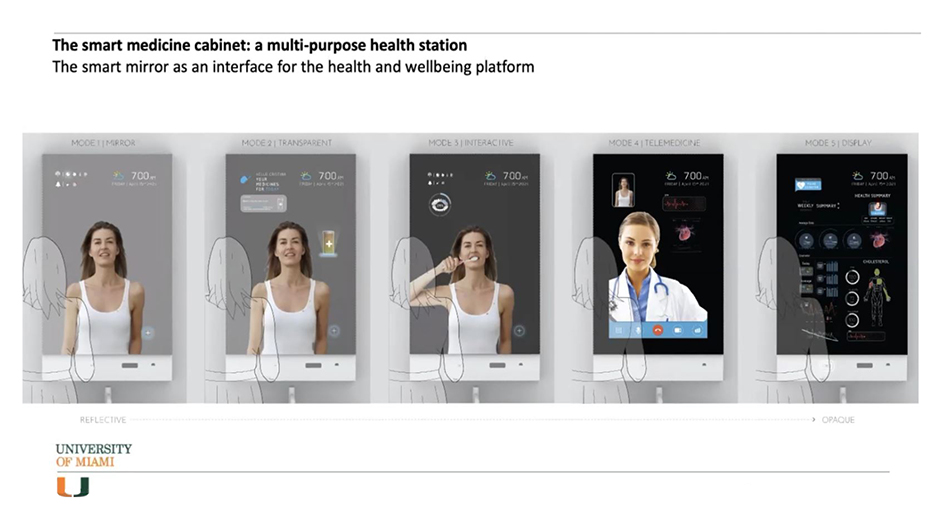
The Innovation Showcase team members included Rodolphe el-Khoury, Dean of the School of Architecture and Program Director of IDSC Smart Cities; Nicholas Tsinoremas, Vice Provost for Research Computing and Data and Founding Director of IDSC; Sylvia Daunert, the Lucille P. Markey Chair of Biochemistry and Molecular Biology at the Miller School of Medicine; Sapna Deo, Associate Professor and Graduate Program Director of Biochemistry and Molecular Biology at the Miller School of Medicine; Leonidas Bachas, Dean of the College of Arts and Sciences, and Yelena Yesha, Innovation Officer and Head of International Relations for IDSC.
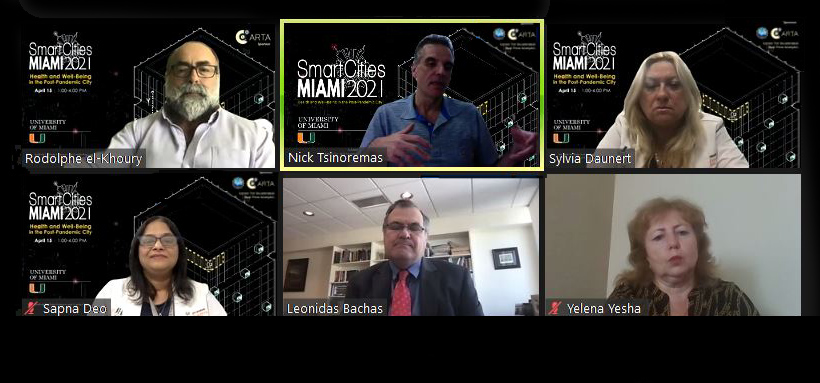
“Healthcare is moving towards the home,” said IDSC Director Nick Tsinoremas, who looks forward to continuing to develop the prototype and working with partners outside of the University. “This is an opportunity to have a ‘candy store’ of all the data in one place if you will.”
Dr. Yelena Yesha, who is also a Visiting Distinguished Professor of Computer Science and an expert in healthcare cybersecurity, said the new smart home health hub is not meant to replace care or medical professionals but is “bridging the gap between providing healthcare in the remote environment versus having it in the physical environment.” “This is will be an opportunity to infuse the data so that we can seamlessly, in real-time, analyze this data and make sense of it,” said Dr, Yesha, who’s aware of the need for patient consent of this new technology. “We want to build intelligence to assist the medical professional.”
The three-hour Conference featured participants from government, academia, and private industry who each shared how smart city technology can be used to solve issues around the pandemic and healthcare. The Conference kicked off with a welcome message from University of Miami Provost Jeffrey Duerk, followed by Keynote Speaker Michael Mylrea, Senior Technical Advisor to the University of Maryland, Baltimore County’s (UMBC) Center for Accelerated Real Time Analytics (CARTA), who discussed blockchain technology and cybersecurity surrounding data collection.
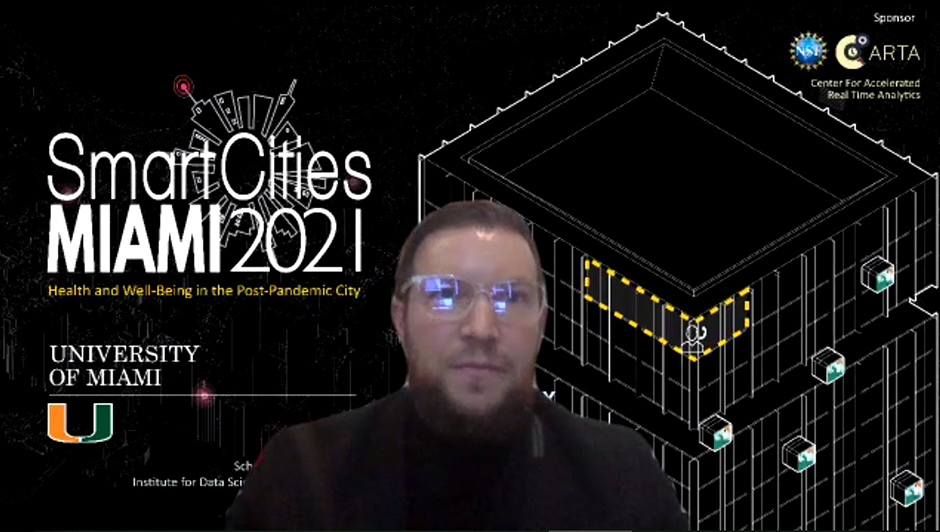
The first panel, Session 1, was entitled “Healthcare in the Smart City” and included Moderator: Yelena Yesha, panelists Jeb Linton, Senior Technical Staff Member and Master Inventor at IBM; Pamela Tomski, Analytics Advisor and Energy/CCUS Expert at SAS; Pierre-François D’Haese, CEO, Neurotargeting; Mic Bowman, Sr. Principal Engineer, Intel Labs; and Frank Ricotta, CEO & Founder of BurstIQ.
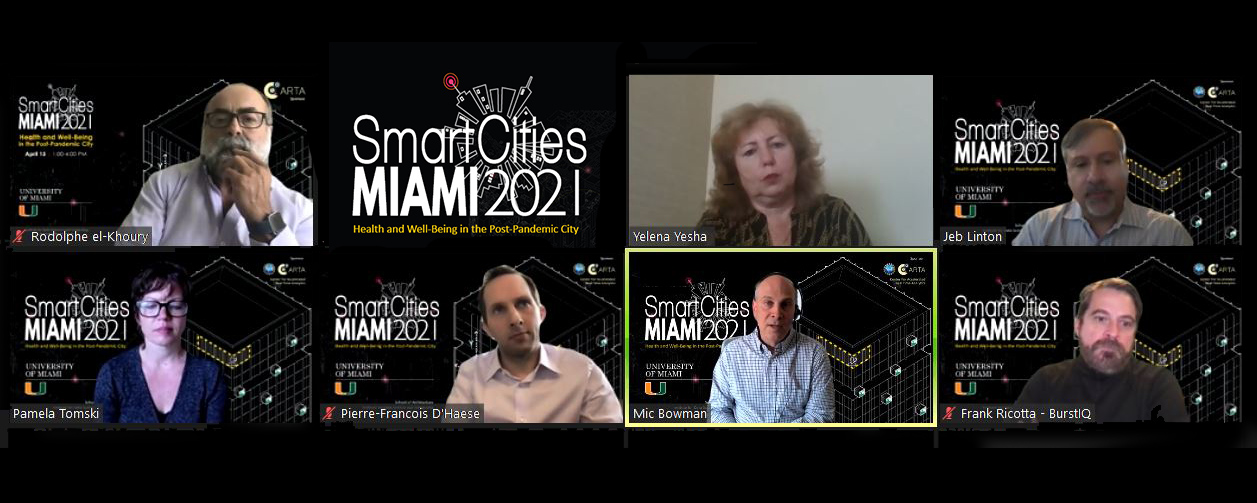
Plenary Keynote Speaker Mark Wolff, Chief Health Analytics Strategist for the SAS Institute (an international data analytics firm) shared his experiences in healthcare and how the internet of medical things (IoMT) and edge analytics are shifting the overall health care sector.
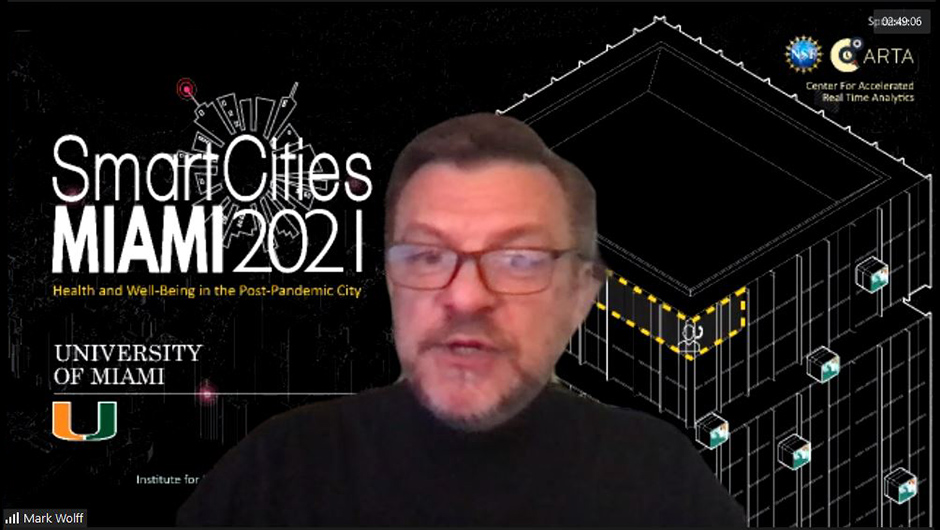
The Conference also allowed professionals the chance to meet other leaders in the field, and to share knowledge about practices in place today that are making cities more digitally connected than ever.
In closing, Dr. Tsinoremas and Dr. Yesha underscored how important having a smart home health hub will be for individuals in a post-pandemic world.
“The integration of state-of-the-art technologies, with the data acquisition and handling done in a protective way, and then being able to communicate with the physician and the healthcare providers in a seamless way is a totally novel concept that does not exist,” said Yesha. “We have the Fitbits of this world and the Apple Watch that will tell us some information, but it is not like a holistic, total approach like the smart homehealth hub will have. We are going one step further.”
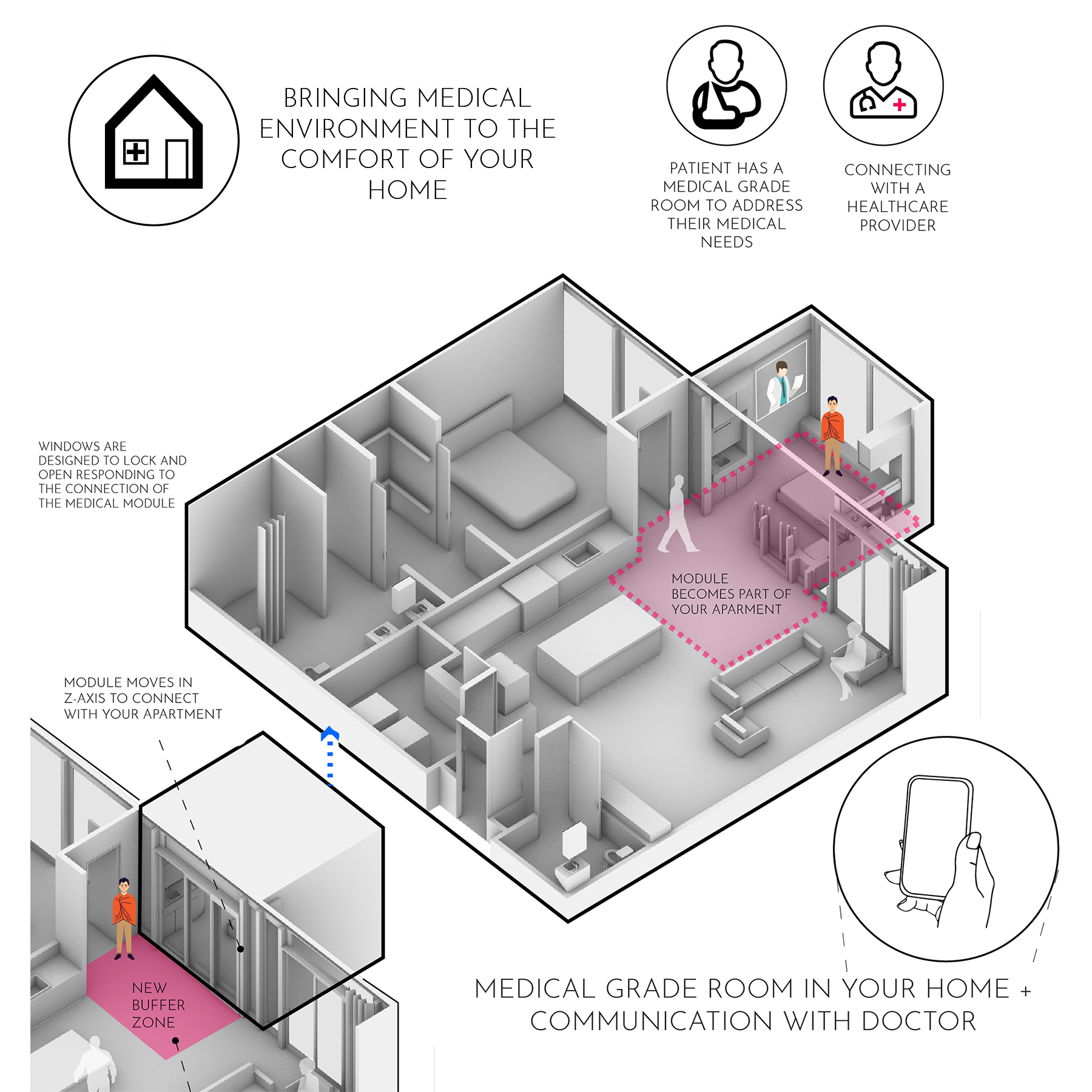
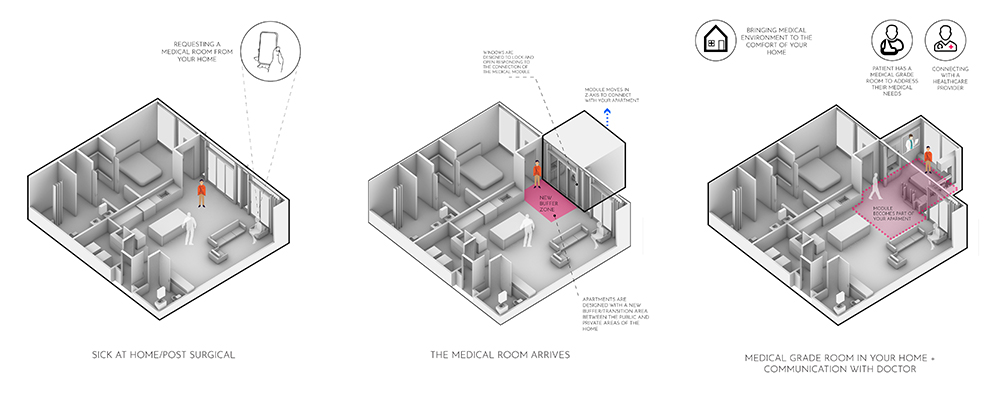
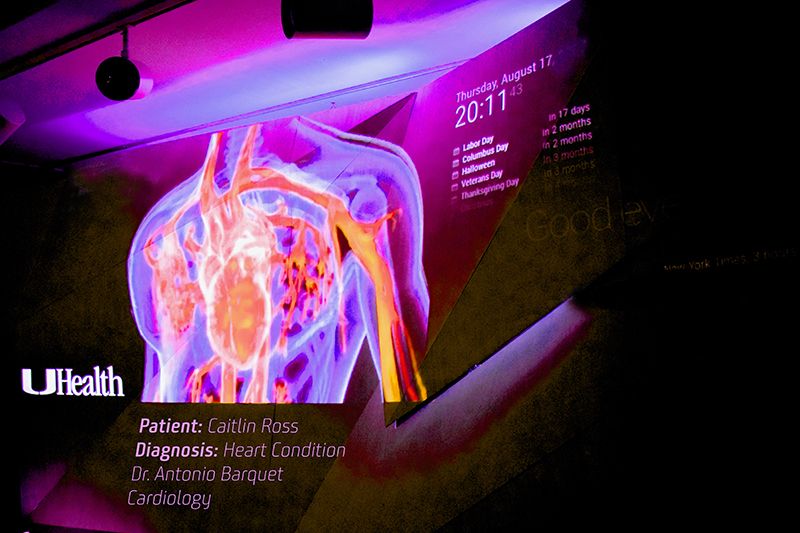
This article “The Hospital at Home—Visionary Thesis Project Addresses Pandemic and Future of Health Care” takes a look at issues around the pandemic and health care and offers an inspiring solution:
Part-time Lecturer Donnie Garcia-Navarro’s interest in health care design predates the COVID-19 crisis, but his 2020 master’s thesis is a timely and potential global solution to pandemic issues. “Atomized Hospital: The Future of Health Care + Patient Isolation at Home” explores not only minimizing the spread of infection but also focuses on decentralizing medical treatment.
Garcia-Navarro studied greater Miami, its sprawled development pattern, its disparity in access to quality health care plus several other factors—and created a prototype for bringing expert physicians, nurses, and other medical professionals to the patient. While there are many facets to his research, the most eye-catching is an animation that shows healthcare pods/isolation units that can move about a residential mid- to high-rise—attaching to balconies or common areas to deliver skilled care.
Garcia-Navarro—always interested in the intersection of technology, healthcare, and architecture—began looking at booming population increases predicted for Miami and looked at innovative ways to deliver healthcare to a broader swath of its diverse community. He addresses expanding needs at the macro, meso, and micro levels.
“The macro creates a network of healthcare spaces throughout the city, which alleviates the pressure on centralized emergency rooms and hospitals,” he said. “The meso level looks at the pods for care at the amenity floor of a building. It could be visited by neighbors seeking care, or become an isolation unit.”
Created in collaboration with RAD—a research unit led by Dean Rodolphe el-Khoury—the micro level re-imagines the medicine cabinet mirror as a smart device. “Its digital display and sensors could track your prescriptions, remind you when it’s time to take your medicine,” Garcia-Navarro said of the product-based healthcare design.
“The future of healthcare is centered around the patient. The Atomized Hospital provides healing at the comfort of the home. Particularly a relevant and timely solution given the recent COVID-19 challenges. To make the project feasible to all strata of society the project was designed at different scales, City, Building, and Home, said Dr. Deborah Franqui, AIA, who pushes the envelope of healthcare design with her courses at U-SoA. “The project ranges from immediate solutions to long-term healing at home. Features such as the automated medicine cabinet are sensitive to the current needs of the population affected by multiple chronic conditions. The automized hospital provides creative and technical solutions in the wake of COVID-19.”
As people live longer and costs spiral, Garcia-Navarro’s future projects aim to bring innovative and affordable health care solutions to diverse and distant communities—making wellness, treatment, and recovery pervasive and equitable.
Garcia-Navarro’s former thesis advisor, Dean el-Khoury sees healthcare at home as one of today’s big design challenges and opportunities: “I’m pleased to see U-SoA tackling this issue and delighted by Donnie’s visionary project. I’m now looking forward to what he will propose next.”
SOURCE: NEWS@TheU | By Steve Wright
